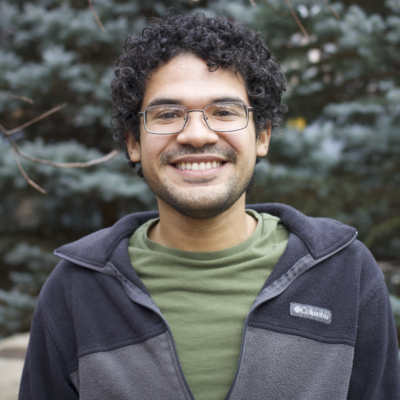Student Spotlight: George Padilla

October 14, 2024
George Padilla is a master’s student in materials science and engineering and the Ezra’s Bridge program from Philadelphia, Pennsylvania. He earned his B.S. in biology at Temple University and now studies the physics underlying dense liquid droplets made from enzymes under the guidance of Julia Dshemuchadse at Cornell.
What is your area of research and why is it important?
I develop computational models that capture the physics underlying dense liquid droplets made from proteins called enzymes. These ‘living’ droplets, known as protein condensates, play a key role in regulating important cellular processes while displaying unique material properties. My research focuses on using these models to better characterize protein condensate behavior and structure, especially while enzymes inside them are actively involved in chemical reactions. Through modeling protein condensates, we can unlock more efficient ways to simulate complex biological systems, making previously intractable problems easier to study and solve.
What are the larger implications of this research?
Protein condensates mediate pivotal biological phenomena such as gene expression, stress responses, and biofabrication of functional materials like spider silk. Understanding the physical rules through which nature utilizes condensates to perform diverse functions unlocks opportunities for innovation in materials design. Our models could pave the way for developing bio-inspired materials with active and adaptable properties. Such materials may find applications in areas like medicine, enhancing drug delivery, and microrobotics, enabling more precise and responsive devices.
What does it mean to you to have received an NSF Graduate Research Fellowship?
Being awarded the NSF GRFP is an incredible honor! Not only does it support my own scientific inquiry, but it also empowers me to be a source of visibility and advocacy for others. Receiving this fellowship felt like a green light in my journey as a scientist, affirming that I’m on the right (sometimes labyrinthine) path. The fellowship allows me to contribute new insights into the field of protein science and inspire others in my community to pursue careers in STEM.
What will your fellowship allow you to do that you may not have been able to otherwise?
As an NSF GRFP fellow, I have gained access to a wide range of resources, including networking opportunities, internships, and supercomputing. I am excited to get involved with the NSF INTERN program, which provides fellows the chance to gain experience in industry, government labs, or nonprofit organizations!
If you participated in any of the Graduate School’s NSF GRFP programming last fall, either an information session or peer review session, how did it help you prepare your application?
I attended the Graduate School’s NSF GRFP overview session last September, where past GRFP fellows at Cornell shared their tips and advice for applying. The session offered a holistic perspective on what makes a competitive application—fellows shared not only their academic achievements but also how their experiences outside the classroom shaped their application. I found it to be an engaging and helpful session, with plenty of opportunities to ask questions. I’d highly recommend it to anyone applying to the GRFP!
What are your hobbies or interests outside of your research or scholarship?
I enjoy hiking around Ithaca, trying new (to me) foods, and experimenting with recipes! I like learning about different languages and cultures—recently, I’ve been exploring Central Asian and Slavic folklore. I’m also passionate about outreach, especially engaging underrepresented communities in STEM, and I look for opportunities to support others in their learning whenever I can!
Why did you choose Cornell to pursue your degree?
Cornell’s field of materials science and engineering (MSE) stood out to me because of how interdisciplinary MSE and the College of Engineering are. My research interests are also interdisciplinary, spanning materials science, computer science, and biology, so this environment felt like the perfect fit. Once I found out that I was accepted into the Ezra’s Bridge program, I knew Cornell was the right choice.
